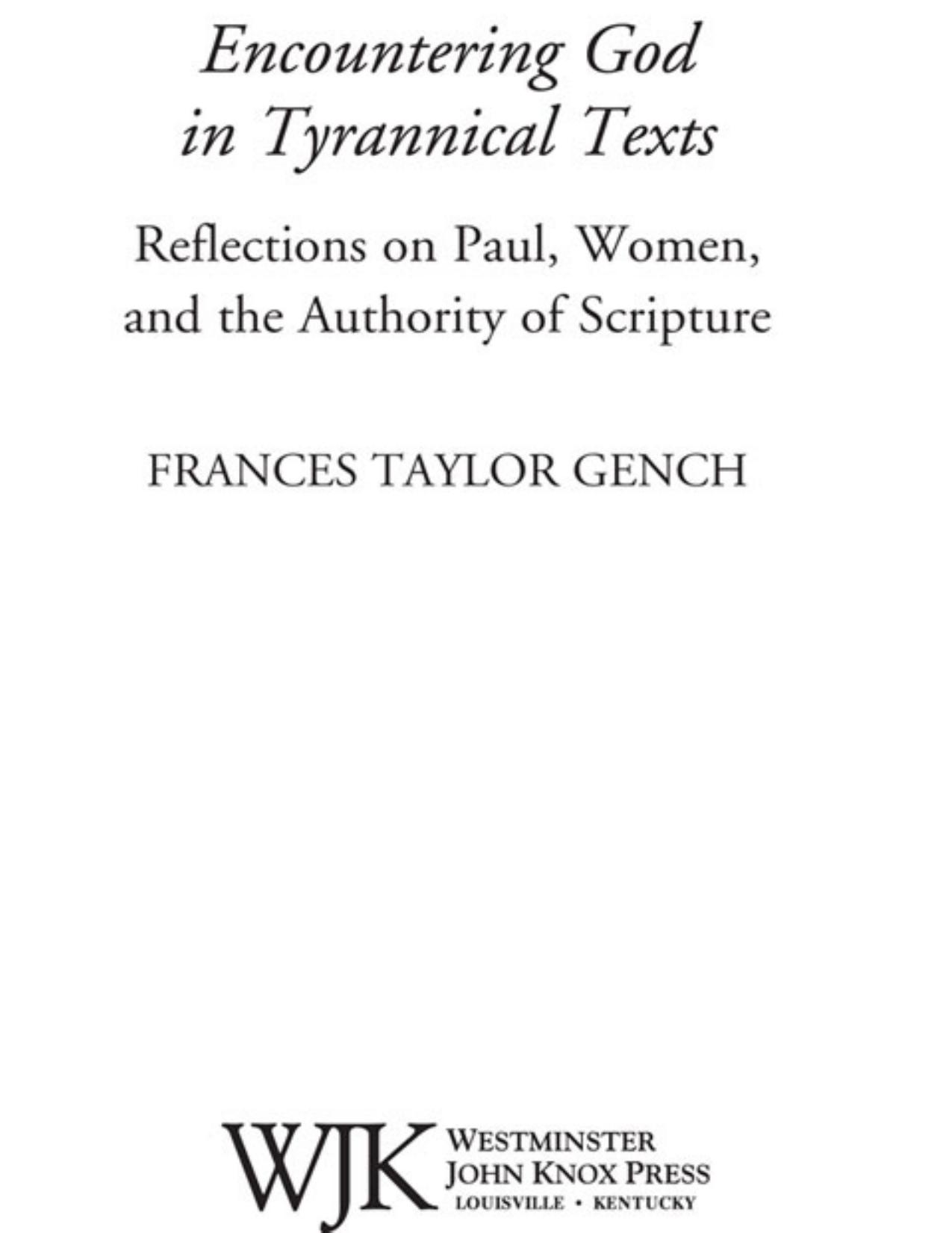Encountering God in Tyrannical Texts by Frances Taylor Gench

Author:Frances Taylor Gench [Gench, Frances Taylor]
Language: eng
Format: epub, pdf
ISBN: 9780664259525
Publisher: Presbyterian Publishing Corporation
Published: 2015-05-15T04:00:00+00:00
ARTICULATING OUR OWN SENSE OF THE TEXT
Debate over 1 Corinthians 14:33b–36 is far from settled and will no doubt continue to be vigorous, given the dismay it evokes for many contemporary Christians and its invocation by many others as enduring ecclesial policy. It behooves us to participate in the debate, to articulate our own sense of the text, and to set forth alternative readings of it. We have a responsibility to do so if we claim to be “people of the book” who cling to the Bible as a foundational document that authors Christian identity and community. As Jean-Paul Sartre declared, “You are perfectly free to leave the book on the table. But if you open it, you assume responsibility for it.”38 Thus we must deal forthrightly with a text that Holly Hearon has aptly described as “a canonical embarrassment.”39
The fact that it is canonical further compels our own wrestling with it. The authorship question has little bearing on the question of its authority, for whoever authored 1 Corinthians 14:33b–36, it is still in the biblical canon. Its authority stems not from its authorship, but from its canonical status. Thus it will not do to declare that Paul did not write it, or to pronounce it an antiquated relic that no longer need concern us and thereby summarily dismiss it.40 As we have already noted, we are related by baptism to the believers in first-century Corinth and to the author of this text (whether Paul or another!), and the canonical witness to their conversation continues to be a means by which the church, through the ages, discerns God’s will for it in new times and places. We are not just reading someone else’s mail—we are reading our own, and by the power of the Holy Spirit, it continues to bring us into the living presence of God and to shape our vision of the world in light of God’s plans and purposes—even when we find ourselves wrestling with its claims and sometimes against its claims. Thus, even a text like 1 Corinthians 14:33b–36 has a role to play in forming within us the mind of Jesus Christ.
The practice of listening carefully and patiently to the text and to the scholarly debate that continues to swirl around it has been the starting point for our engagement with it. As varied points of view have been considered, each of us has no doubt found some perspectives more compelling than others, though all have provided intriguing food for thought. Speaking for myself, I have long found “the interpolation theory” a largely (if not entirely) persuasive explanation for the text’s puzzling lack of coherence with other aspects of Paul’s theology and practice—for example, his fundamental insistence on the Spirit’s generous bestowal of gifts on all members of the church for the edification of the whole community, with the result that “each” has a gift to share in worship and “all” can participate, as well as his evident full partnership with women in ministry and mission.
Download
Encountering God in Tyrannical Texts by Frances Taylor Gench.pdf
This site does not store any files on its server. We only index and link to content provided by other sites. Please contact the content providers to delete copyright contents if any and email us, we'll remove relevant links or contents immediately.
| Guides | New Testament |
| Old Testament |
The Five People You Meet in Heaven by Mitch Albom(3550)
The Secret Power of Speaking God's Word by Joyce Meyer(3172)
Real Sex by Lauren F. Winner(3013)
Name Book, The: Over 10,000 Names--Their Meanings, Origins, and Spiritual Significance by Astoria Dorothy(2978)
The Holy Spirit by Billy Graham(2943)
0041152001443424520 .pdf by Unknown(2843)
How The Mind Works by Steven Pinker(2811)
ESV Study Bible by Crossway(2773)
Ancient Worlds by Michael Scott(2681)
Churchill by Paul Johnson(2577)
The Meaning of the Library by unknow(2564)
The ESV Study Bible by Crossway Bibles(2548)
The Gnostic Gospels by Pagels Elaine(2527)
MOSES THE EGYPTIAN by Jan Assmann(2411)
Jesus by Paul Johnson(2352)
City of Stairs by Robert Jackson Bennett(2347)
The Complete Dead Sea Scrolls in English (7th Edition) (Penguin Classics) by Geza Vermes(2270)
The Nativity by Geza Vermes(2226)
Ancient Near Eastern Thought and the Old Testament by John H. Walton(2221)
